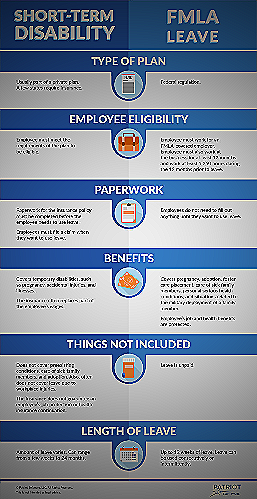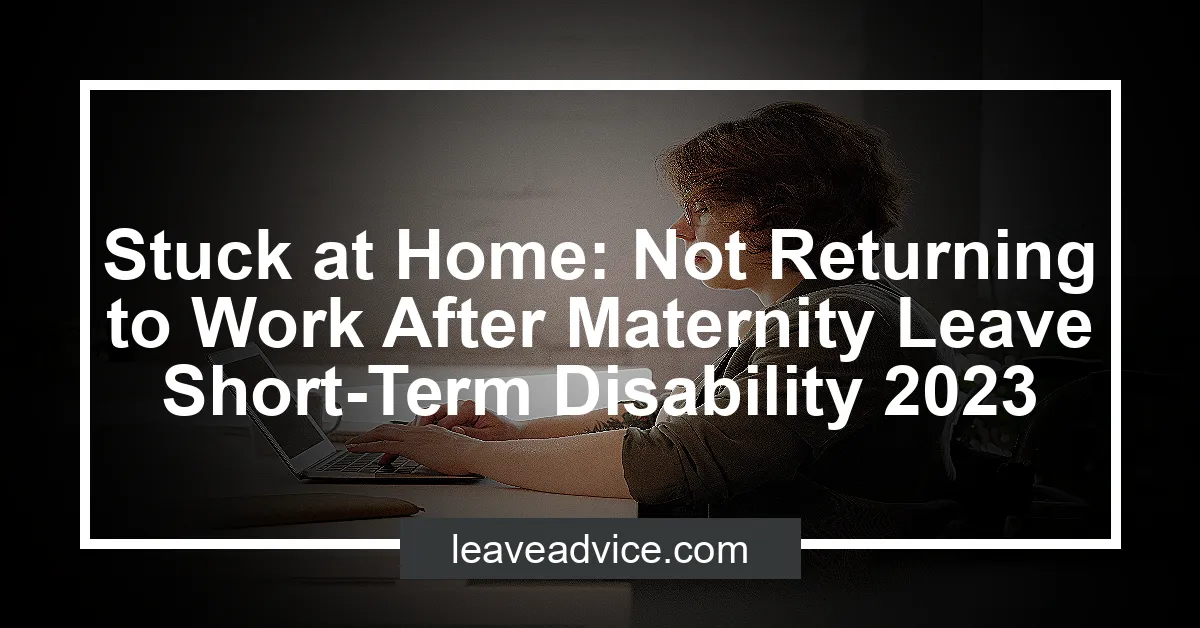Stuck at Home: Not Returning to Work After Maternity Leave Short-Term Disability 2023
Legal Issues Surrounding Not Returning to Work After Maternity Leave and Short-Term Disability
It is important to consult with an employment lawyer to understand your rights regarding not returning to work after maternity leave and short-term disability. Employers are required to follow the Family and Medical Leave Act (FMLA) and state laws regarding leave, but it is important to review your employment contract and company policies regarding returning to work after leave.
Financial Implications of Not Returning to Work After Maternity Leave and Short-Term Disability
Not returning to work after maternity leave and short-term disability can have significant financial implications. It is important to review your company’s policies and understand how your decision may impact your benefits, such as health insurance and retirement plans.
Additionally, it is important to consider how losing your income may impact your personal finances and budget.
Are you expecting a baby soon and worried about your finances during maternity leave? Check out this Youtube video for advice on navigating unpaid FMLA and short-term disability.
Gain valuable insights on how to manage your leave and finances while taking care of your new bundle of joy. Don’t miss out on this helpful resource!
Short-Term Disability: An Overview
Short-term disability is a type of insurance that provides partial income replacement for employees who become temporarily unable to work due to illness, injury, or medical procedure. Typically, short-term disability benefits can last for a few weeks up to several months depending on the severity and nature of the condition.
Eligibility and specific benefits differ depending on the employer’s insurance policy or the state laws that govern short-term disability.
For employees who are not returning to work after maternity leave short-term disability can offer financial support during an extended leave of absence from work. If you have short-term disability coverage, you may be able to receive a portion of your salary for up to twenty-six weeks while on leave.
It is essential to review your employer’s disability policy and enrollment windows and establish a plan early in your pregnancy if you are planning to become a mother. Short-term disability can provide financial assistance during your leave of absence, enabling you to focus on your newborn and recovery rather than stressing over a loss of income.
Reviewing and understanding the benefits available to you is crucial to ensure that you receive the maximum support in the event of an illness, injury or procedure that renders you unable to work.
What Happens When You Don’t Return to Work After Maternity Leave and Short-Term Disability?
Returning to work after maternity leave and short-term disability can be a difficult decision. What happens if you decide not to return?
This section will explore the legal and financial consequences of not returning to work.
Legal Consequences
If you decide not to return to work after maternity leave and short-term disability, there are legal consequences to consider. Depending on the reason for not returning, you may be at risk of losing certain employment-related benefits such as health insurance and retirement savings.
In some cases, you may be required to repay a portion of the benefits you received while on leave.
Additionally, your employer may have the legal right to terminate your employment. However, under the Pregnancy Discrimination Act (PDA) and the Family and Medical Leave Act (FMLA), you may be protected from discriminatory employment practices related to pregnancy and childbirth.
If you feel that your rights are being violated, you have the option to consult with a workers’ compensation lawyer who can assess if you have a legal case.
Financial Consequences
Not returning to work after maternity leave and short-term disability can also lead to financial consequences. If you received short-term disability benefits, you may have to repay a portion of the benefits if you do not return to work as agreed upon.
Moreover, if you decide not to work, you will miss out on income and employment-related benefits such as bonuses and pay raises. In the long run, this can also impact your retirement and social security benefits.
It’s important to consider these financial consequences when making the decision on whether or not to return to work after maternity leave and short-term disability.
Considerations for Quitting on Short-Term Disability
Quitting your job while on short-term disability is a tough decision. It may be necessary for your recovery or personal circumstances, but there are several considerations to take into account before making the decision.
Here are some things to keep in mind:
Paying Back Benefits
If you are receiving short-term disability benefits from your employer, you may be required to pay back the benefits if you quit your job. However, this depends on the specific policy and terms of your plan.
It’s essential to read and understand your policy and consult with your HR representative before making a decision.
Citations.
Leaving a job while on short-term disability may affect future job prospects, and you may not be able to use your current employer as a reference. However, you can always use other professionals to provide professional recommendations such as colleagues, clients, or former supervisors who are familiar with your work ethics and abilities.
Impact on Insurance Premiums
When you leave a job, you may lose access to disability insurance benefits offered through your employer. In some cases, your decision not to return to work could impact the funding of insurance premiums for the rest of the group of workers.
However, it will depend on the insurer’s policies and the specific circumstances surrounding your decision. Consulting with an HR representative or a workers’ compensation lawyer can provide you with guidance on potential consequences.
Ultimately, the decision to quit your job while on short-term disability is an individual one that requires consideration of multiple factors. Careful consideration of the above points can help you make a more informed decision.
Seeking advice from relevant professionals such as HR representatives can provide additional guidance.

Accommodations for New Parents
When it comes to accommodations for new parents in the workplace, there are legal requirements that employers must follow. For example, the Family and Medical Leave Act (FMLA) allows employees to take up to 12 weeks of unpaid leave for the birth of a child.
Additionally, the Americans with Disabilities Act (ADA) requires employers to provide reasonable accommodations for employees with disabilities, including those related to pregnancy and childbirth.
Some examples of accommodations that may be available include ergonomic or more comfortable work tools, such as a special chair or additional walking breaks during the day. New parents may also be eligible for additional leave or a flexible working schedule after the birth, depending on doctor recommendations.
And for nursing mothers, employers must provide a private room for nursing or pumping.
It’s important to note that while these accommodations are available, not all employers comply with the legal requirements. If you believe that your employer is not providing accommodations that you are entitled to, it may be necessary to seek legal advice.
Quitting While on Maternity Leave
If you have decided not to return to work after taking maternity leave and short-term disability, there are a few things you should keep in mind. First, unless your employment contract includes restrictions on quitting, you have the right to resign.
However, it is important to be aware of the potential consequences of quitting while on leave.
One consequence of quitting while on leave is that you may lose any benefits that are tied to your employment, such as health insurance or short-term disability benefits. Additionally, if you received short-term disability benefits and do not return to work, you typically do not have to pay back the benefits you received.
When quitting while on maternity leave, it is important to follow the normal resignation procedures outlined in your employment contract, giving the required notice period. If you resign during your maternity leave, you do not have to return to work during your notice period and can remain on leave.
If you are considering quitting while on leave, it may be beneficial to speak with an employment lawyer or HR representative to understand your options and any potential consequences. It is also important to consider alternative options, such as requesting to extend your leave or negotiating alternative work arrangements that can support your needs as a new parent.
Frequently Asked Questions
What is short-term disability?
What are the legal consequences of not returning to work after maternity leave and short-term disability?
Can I quit during or after maternity leave without paying back my benefits?
Are new parents entitled to accommodations in the workplace?
What are the potential consequences of quitting while on maternity leave?
Conclusion
Deciding whether to return to work after maternity leave and short-term disability can be a complex decision. It is crucial to consider legal and financial aspects, such as short-term disability insurance, legal power, and funding of insurance premiums.
Employers should also provide reasonable accommodations for nursing and pumping and flexible working schedules after childbirth. If you decide not to return to work, you should resign properly, and quitting will not require repayment of short-term disability payments.
Using short-term disability insurance to cover parental leave is also possible, and workers may be eligible for both short-term disability and Paid Family Leave after childbirth.

